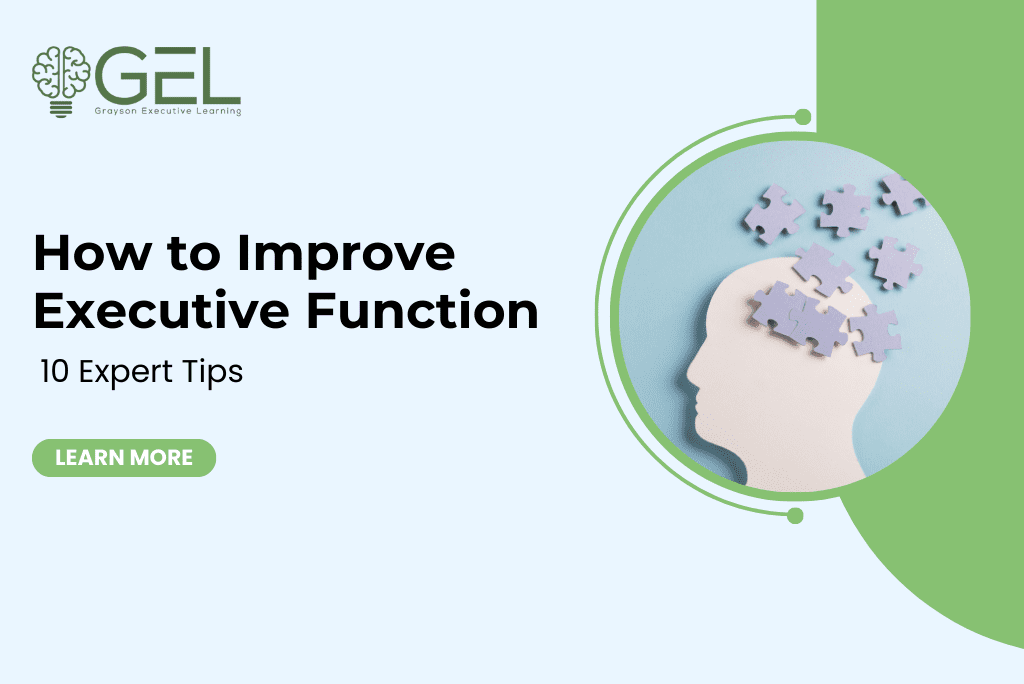Success isn’t always determined primarily by intelligence or talent. It’s often a mastery of executive functioning skills that propel an individual forward. They complete tasks easily, express good time management, and make sound decisions. Learning effective strategies on how to improve executive function and enhance cognitive performance is essential for achieving success in various aspects of life, including academics, work, and daily activities.
For individuals with Attention Deficit Hyperactivity Disorder (ADHD), executive functions may be particularly challenging. Yet, they are incredibly rewarding. Developing an executive functioning (EF) training program can increase child development by promoting self-regulation, emotional control, and sustained attention. Let’s see how.
In this article, we’ll consider what executive function is and some practical parenting tips. These will help you assist your family members to develop the cognitive flexibility needed to address executive dysfunction and acquire the skills for a more successful daily life.
What Exactly are Executive Functioning Skills?
Executive function can be likened to the conductor of an orchestra, orchestrating various cognitive processes to achieve goals effectively. It encompasses a range of mental skills that touch on planning, organization, time management, attention control, and emotional regulation.
Think of executive function as the CEO of brain function, overseeing and coordinating all aspects of thinking and behavior to accomplish tasks efficiently.
The prefrontal cortex is the part of the brain responsible for executive functions. This includes skills like working memory, cognitive flexibility, sustained attention, inhibitory control, motivation, response inhibition, and emotional control. When poor executive functioning skills are expressed, it can be an indication of an issue like ADHD or learning disabilities. However, through EF training and regular practice, these skills can be learned.
Common Executive Function (EF) Skills
Perhaps we can get a better understanding of executive functioning skills by looking at a brief list of the skills that many children need to develop that aid in completing tasks. This isn’t an exhaustive list, but highlights a few of the important executive functioning skills that are directly tied to challenges seen in individuals with ADHD.
Planning and Organization
The ability to set goals, create a road map to achieve them, and efficiently manage resources is one of the most common executive functions. These cognitive skills are linked to success as we all need to set and work toward goals to improve ourselves.
The issue with ADHD is that it can cloud this ability to see past mistakes and develop a pathway forward. A child may need assistance with task initiation – a “push” – to get forward movement while still paying attention to and learning from what happened earlier.
Time Management
Allocating time appropriately for different tasks, prioritizing activities, and meeting deadlines are a second set of executive functioning skills. This goes beyond a lack of self-control. Kids and adults with ADHD have a different processing speed and method that can prove challenging.
Attention Control
Those with weak executive function skills may have issues with attention control. They may have difficulty focusing on relevant information while filtering out distractions, sustaining attention over time, and shifting focus from one task to another when necessary.
Problem-Solving
We all must learn to solve problems that crop up in daily life. People with ADHD may be sidelined in this ability with difficulties in identifying challenges, generating potential solutions, and evaluating their effectiveness.
Emotional Regulation
One other skill we will mention is emotional regulation. This is managing emotions in a way that promotes goal-directed behavior, resilience, and positive social interactions.
As we see from the list above, many children with ADHD may not only lack the ability to identify a specific task they need to accomplish, but they also can’t figure out how to achieve it or express the impulse control to attain it.
Having an executive function disorder is like an archer that must shoot an arrow but doesn’t see the target, know the direction of the wind, or how to string the bow. Fortunately, there are steps that parents and family members can take to help youths develop more robust EF skills.
Improve Executive Functioning Skills: A Guide for Students and Younger Children
Enhancing executive function skills requires practice, patience, and strategic intervention. Here are some actionable steps students can take.
Utilize Visual Aids
Break tasks into smaller, manageable steps. Create checklists or visual schedules to track progress. This can be the gentle “push” that is needed to keep one on task. To-do lists make goals more concrete, less abstract. They also help in training working memory to focus on a certain task and tie it to the next step in a process.
Develop Time Management Strategies
Use tools like planners, timers, or digital apps to allocate time effectively and stick to deadlines. Create incentives. Develop a reward system that boosts motivation to get things done.
Practice Mindfulness
Engage in activities such as deep breathing, meditation, martial arts, or yoga to enhance attention control and emotional regulation. This addresses the specific executive function of focus and can also reduce stress.
Build Organizational Habits
Designate specific spaces for study or work, remove clutter regularly, and establish routines to minimize cognitive load. Lack of organization will breed a lack of focus.
Seek Support and Feedback
Don’t hesitate to reach out to teachers, mentors, or coaches for guidance and feedback on improving executive function skills. If you have ADHD, you are not alone. Support groups can bring you together with others who have overcome similar challenges.
Supporting Your Child with ADHD and Executive Functioning Issues
Parents play a crucial role in nurturing and developing their child’s executive function skills. Here’s what they can do to help.
Create a structured environment by establishing consistent routines, provide clear expectations, and offer support in organizing tasks and materials.
Encourage self-advocacy in your child. Teach them to recognize and to communicate their needs effectively. When they seek assistance and advocate for accommodations if required, they will see greater academic and professional success.
Promote habits that support physical health. Prioritize adequate sleep, nutrition, and physical exercise, as these factors significantly influence cognitive functioning and emotional regulation.
Model executive function skills yourself. Demonstrate effective planning, problem-solving, and time management behaviors in your own life. Serve as a role model for your child.
Celebrate your child’s progress. Acknowledge their efforts and achievements, fostering a positive attitude towards learning and skill development.
Managing Executive Function Disorder Successfully
Mastering executive function skills is vital on the road of life. While individuals with ADHD may face unique challenges, with the right strategies and support systems in place, they can unlock their full potential and thrive in various domains of life.
By implementing the suggestions outlined in this article, both students and parents can embark on a transformative journey towards enhancing executive function skills and realizing their goals. Remember, progress may be gradual, but every small step forward brings you closer to success.
If you’re curious what GEL can bring to the table, talk to us about what working with an executive function coach would look like.


